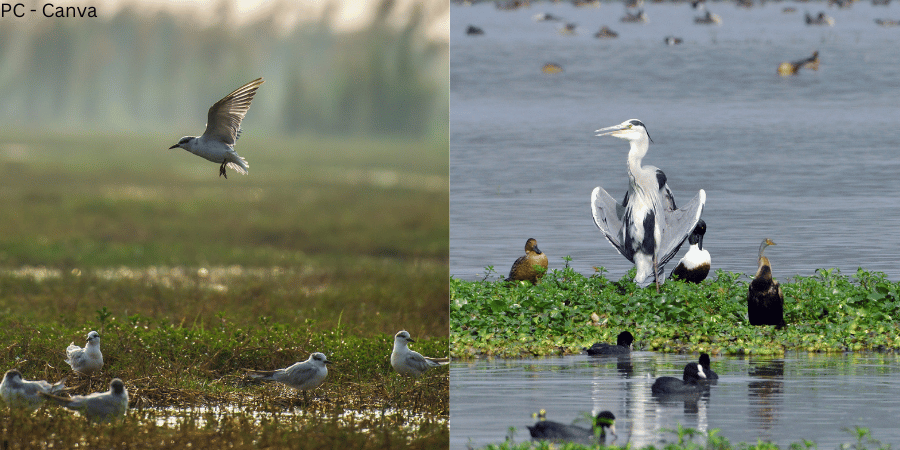When Vaibhav Anant was working for a Delhi-based ed-tech firm in 2018, there was a lot of buzz around the Indian government’s announcement that single-use plastics will be phased out by 2022. This, he claims, piqued his interest in the topic of single-use plastic (SUP) and its negative consequences. (On the left, Vaibhav Anant, CEO and founder of Bambrew, a green-tech sustainable packaging company.)
Vaibhav came across a viral video of a marine biologist extracting a plastic straw lodged in a sea turtle’s snout during his investigation. Given the prevalence of SUP straws in the food delivery industry, he felt compelled to offer a remedy after witnessing that animal suffer. He founded Bambrew in August 2018 after quitting his job to provide alternatives to SUP straws. He eventually got into packaging.
The Bengaluru-based green tech sustainable packaging startup, Bambrew is dedicated to eliminating the usage of SUP. It makes use of natural plant fibres and pulp to generate eco-friendly and long-lasting packaging alternatives to hazardous plastic (mostly SUP).
So, What is Bambrew?

Bambrew is committed to sustainability, creating a variety of environmentally friendly goods manufactured from bamboo, sugarcane, and seaweed. All of our goods are one-of-a-kind, reusable, and the ideal natural alternative to plastic. They’re light, strong, and completely biodegradable. Furthermore, they do not utilise any chemicals or pesticides in their manufacturing process.
Their goal is to not just transition to a more sustainable lifestyle, but also to improve local communities. They push for sustainable development that benefits residents while also preserving the environment for future generations. Their products are manufactured entirely by hand by diverse tribes from across the country. They rely entirely on experienced local expertise to provide you the best, from harvesting to processing.
Bambrew takes pleasure in being a company that targets global companies that contribute significantly to plastic waste generation in traditional areas such as e-commerce, retail, FMCG, F&B, pharmaceuticals, and so on.

Amazon, Nykaa, 1MG, Puma, Chumbak, Big Basket, Myntra, Flipkart, Aditya Birla, and Accessorize London are just a few of the companies with whom the company has partnered. They currently make roughly Rs 1.5-2 crore per month in sales and produce around 10 million items (mailer bags, boxes) each month.
Vaibhav Anant’s Journey
Vaibhav was born and raised in a typical middle-class family in Hazaribagh, Jharkhand. His mother, a social worker, and father, an English professor at a nearby university, had no entrepreneurial experience. He graduated from the National Institute of Fashion Technology (NIFT) in Bangalore with a bachelor’s degree in fashion technology (B.FTech).
He had more than five years of corporate experience when he started his own company. Bambrew began by curating a variety of environmentally friendly packaging products made from bamboo, sugarcane, and seaweed. Furthermore, their products were once entirely handcrafted and obtained from various native tribes around the country.
Even with the best of intentions, there would always be concerns about scalability. Bambrew no longer sources from tribal tribes, instead of relying on specialised machinery to produce a variety of products in-house and with other partners.
He had more than five years of corporate experience when he started his own company. Bambrew began by curating a variety of environmentally friendly packaging products made from bamboo, sugarcane, and seaweed. Furthermore, their products were once entirely handcrafted and obtained from various native tribes around the country.
Even with the best of intentions, there would always be concerns about scalability. Bambrew no longer sources from tribal tribes, instead of relying on specialised machinery to produce a variety of products in-house and with other partners.
The goal in developing an alternative way to make it inexpensive and scalable while yet keeping high-quality standards. As a result, they switched to a machine-driven system rather than relying on craftsmen, because the quality of handmade products was uneven.

The packaging sector is responsible for more than 55 percent of the world’s plastic trash, which cannot be recycled or decomposed. Their goal has always been to eliminate plastic in a long-term, sustainable manner.
They work with over 174 manufacturing partners in addition to their factory, which can produce over 75 million mailer bags every month. They have a total capacity of manufacturing or converting more than 50,000 tonnes of sustainable alternatives, or more than 100 million pieces in a month.
They use bamboo and wood pulp which has been verified by the Forest Stewardship Council (FSC). The Forest Stewardship Council (FSC) is a globally recognised certification system that recognises products obtained from responsibly managed, socially beneficial, environmentally conscientious, and commercially viable forests. It’s similar to a fair trade certification for forest-sourced commodities.
They’re also considering hemp as raw material, as it’s the fastest-growing plant aside from bamboo. They collaborate with other mills in India to produce our raw materials. However, some of the raw materials are imported, such as bamboo pulp.
Furthermore, when they apply their patented and indigenously developed technology of coating on paper, it provides it plastic-like qualities while preserving its biodegradability. In other words, they may imbue the properties of plastic onto paper without affecting the paper’s degradability or recyclability.
Bambrew Reduces Over 10,000 Tonnes of Plastics

Bambrew has raised $2.35 million in two rounds of external funding, the most recent of which being a Pre-Series A round. They hope to work with 100 large companies around the country by the conclusion of this fiscal year.
In the B2B and B2C domains, Bambrew has been able to reduce over 10,000 tonnes of plastic by developing viable substitutes that are perfect natural replacements for single-use plastic. They want to expand the organization’s business footprint throughout several Indian cities and foreign markets in the future, and become the world’s first and largest eco-friendly organization, having conquered several hurdles along the way.
If you want to know more about Brambrew – Instagram, Facebook
If you to say no to plastic and loved reading this story, you can also read Say No To Plastic: This Kerala Man Develops Biodegradable Edible, Cutlery From Wheat Bran And Rice
If you know more inspirational stories about any person, company, new idea, or social initiative, write to us on mad4india.com, share such information with us on Facebook or LinkedIn.



